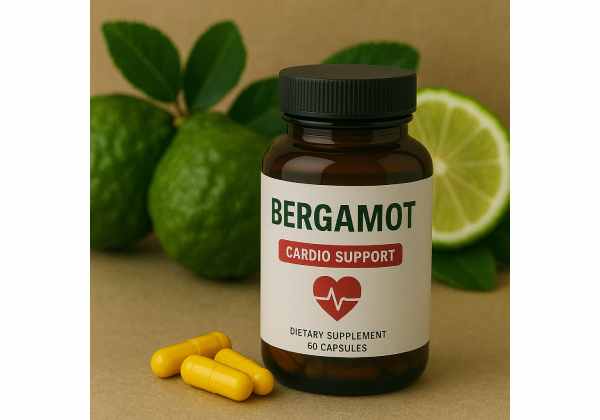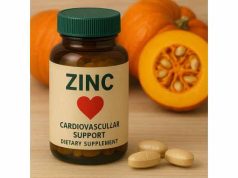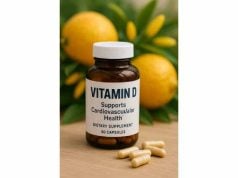
Bergamot, derived from the citrus fruit Citrus bergamia, has been turning heads in the health community for its potential to bolster cardiovascular wellness. Rich in antioxidants and natural compounds that may help balance cholesterol, reduce inflammation, and stabilize blood pressure, this aromatic citrus supplement stands out as a promising ally for preventing heart-related ailments. Whether you seek to maintain healthy arteries, address mild cardiovascular concerns, or explore an additional strategy to complement existing treatments, bergamot for Heart Health offers broad support rooted in both traditional use and emerging scientific research.
Table of Contents
- Essential Background and Key Aspects of Bergamot
- Unraveling the Mechanisms: How Bergamot Operates
- Scientifically Validated Impact on Heart and Vascular Wellness
- Suggested Intake, Practical Considerations, and Safety Measures
- Bergamot FAQ: Answers to Frequently Asked Questions
- References and Scholarly Data
Essential Background and Key Aspects of Bergamot
Bergamot (Citrus bergamia) is a fragrant citrus fruit predominantly cultivated in the coastal regions of southern Italy, particularly in Calabria. The fruit’s distinctive aroma is widely recognized due to its use in perfumes, teas (notably Earl Grey), and various flavoring applications. Beyond its culinary and olfactory heritage, bergamot has garnered interest in modern nutraceutical circles for its unique blend of polyphenols and bioflavonoids, which may actively contribute to heart health.
Historical Roots and Cultural Influence
While the precise origins of bergamot remain debated, some theories suggest it evolved from a cross between lemon and bitter orange. In Italy and neighboring Mediterranean areas, bergamot has long been prized for its essential oil. Historically, local communities employed bergamot’s juice and extracts in home remedies targeting digestive and inflammatory concerns. Over time, anecdotal reports and preliminary scientific findings regarding its beneficial influence on cholesterol and vascular support spurred broader global interest.
Distinctive Bioactive Compounds
Bergamot stands out among citrus fruits due to its particularly abundant profile of polyphenolic compounds. Notable constituents include:
- Neoeriocitrin, Naringin, and Neohesperidin: Potent flavonoids known to exhibit anti-inflammatory, antioxidant, and lipid-balancing actions.
- Brutieridin and Melitidin: Rare citrus-derived flavonoids with structural similarities to statins, potentially aiding in cholesterol regulation.
- Essential Oils: Linalool, limonene, and other aromatic compounds that lend bergamot its signature scent and may offer complementary wellness benefits.
Current Market and Forms of Supplementation
Bergamot is typically accessed for heart-focused uses in several supplement forms:
- Standardized Extracts: These come in capsule or tablet form, often labeled as “Bergamot Polyphenolic Fraction (BPF)” or specifying the key polyphenols.
- Functional Beverages: Some formulations incorporate bergamot extracts alongside green tea or other heart-friendly ingredients.
- Aromatic Oils: While popular for personal care and aromatherapy, these essential oils typically do not deliver significant polyphenol content for internal heart benefits.
- Juice Concentrates: Less common outside of Mediterranean regions, fresh or concentrated bergamot juice can offer certain phenolic advantages, though it can be quite bitter.
Why Bergamot for Cardiovascular Health?
The synergy of bergamot’s anti-inflammatory, cholesterol-managing, and vasodilatory effects may contribute comprehensively to better heart function. These attributes are especially relevant for individuals seeking natural strategies to balance blood lipid levels, support arterial integrity, or reduce metabolic stress that leads to heart disease. As ongoing research further clarifies the scope of bergamot’s impacts, interest continues to expand among health practitioners and those aiming to adopt proactive, nature-derived interventions for their cardiovascular systems.
The following section explains the key scientific and biological mechanisms behind bergamot’s protective influence on heart health, highlighting how each compound works in tandem to uphold vascular resilience.
Unraveling the Mechanisms: How Bergamot Operates
Bergamot’s multifaceted contribution to heart and vascular support arises from a complex web of biochemical interactions. By simultaneously addressing inflammation, oxidative stress, and lipid metabolism, bergamot for Vascular Support may provide a comprehensive shield against factors that often precipitate cardiovascular ailments.
Polyphenols as Antioxidant Agents
Bergamot’s rich polyphenol content ranks among its primary assets for maintaining arterial health:
- Neutralizing Free Radicals: Polyphenols like neoeriocitrin and naringin can help prevent oxidative injury to blood vessels. This curtails the processes leading to atherosclerosis and plaque formation.
- Synergistic Antioxidant Network: The distinct mix of flavonoids in bergamot interacts synergistically, amplifying the total antioxidant capacity far beyond what a single compound could achieve alone.
Cholesterol and Lipid Metabolism
Bergamot’s impact on cholesterol stands out in numerous studies. Possible underlying pathways include:
- HMG-CoA Reductase Modulation: Certain bergamot constituents, particularly brutieridin and melitidin, structurally mimic statin-like activity, potentially reducing the overproduction of LDL (“bad”) cholesterol in the liver.
- Enhanced Bile Excretion: Bergamot extracts might support more efficient bile acid binding and excretion, promoting the body’s clearance of excess cholesterol.
- HDL Support: Some individuals note improvements in HDL levels alongside a reduction in LDL, fine-tuning the lipid ratio that influences heart disease risk.
Anti-inflammatory Effects
Chronic low-grade inflammation underpins various cardiovascular conditions, from hypertension to atherosclerosis. Bergamot’s flavonoids interfere with inflammatory mediators in ways that:
- Dampen Cytokine Release: By lowering cytokines like TNF-α and IL-6, bergamot reduces vascular inflammation critical for plaque development.
- Stabilize Endothelial Function: Less inflammation translates into better regulation of vasoconstriction and vasodilation signals, fostering smooth blood flow and stable blood pressure.
Blood Pressure and Vascular Tone
While bergamot is not primarily classified as a blood pressure supplement, its role in oxidative stress relief and inflammation reduction indirectly benefits arterial flexibility:
- Boosting Nitric Oxide (NO) Availability: Minimizing oxidative harm ensures more nitric oxide remains active, supporting vasodilation and normalizing blood pressure.
- Guarding Arterial Linings: A healthier endothelium can more effectively regulate vascular tension, reducing the mechanical stress that leads to hypertension.
Glycemic Control and Metabolic Support
Abnormal glucose metabolism or insulin resistance propels cardiovascular risk upward. Bergamot helps Cardiovascular Function partly by:
- Improving Insulin Sensitivity: Flavonoids in bergamot may assist tissues in absorbing glucose more effectively, easing the metabolic burden on the heart.
- Reducing Hyperglycemia-Driven Damage: High blood sugar accelerates oxidative stress in vessels. Lowering glucose levels can mitigate this harm, especially in individuals predisposed to diabetes or metabolic syndrome.
Synergistic Interactions with Other Nutrients
Bergamot’s synergy extends to interactions with diet and supplementation:
- Paired with Omega-3 Fats: Combined use may boost the anti-inflammatory environment and refine lipid management.
- Coenzyme Q10 or Hawthorn: Additional heart-focused supplements can align well with bergamot’s stress-lowering and circulatory advantages.
By tackling inflammation, oxidative damage, and dysregulated cholesterol simultaneously, bergamot underscores its multifaceted promise for improving heart health. These plausible mechanisms have driven researchers to explore the tangible cardiovascular outcomes in human trials, which we address in the next section through evidence-based data and clinical observations.
Scientifically Validated Impact on Heart and Vascular Wellness
Bergamot’s standing as a heart-centric supplement hinges not only on historical and anecdotal evidence but also on a collection of scientific studies underscoring its functional relevance in cardiovascular care. From cholesterol modulation to potential improvements in inflammatory markers, the following highlights present a snapshot of bergamot’s clinically researched capacities.
Lipid Profile Enhancement
- LDL and Total Cholesterol: Multiple clinical trials find that bergamot extract can significantly reduce LDL levels by 15–30% depending on dosage and formulation. Participants often experience parallel drops in total cholesterol, indicating broad lipid-lowering potential.
- HDL Increase: Some participants also observe a moderate boost in HDL (“good”) cholesterol, shifting the LDL:HDL ratio in a favorable direction conducive to heart health.
Triglyceride Reduction
Elevated triglycerides intensify the burden on cardiovascular systems, especially in those with metabolic syndrome:
- Studies on Hyperlipidemia: Research focusing on individuals with high triglyceride counts shows that daily bergamot supplementation can produce measurable declines (up to 35% in certain data sets) after several weeks, aligning with less risk for arterial plaque buildup.
Blood Pressure Insights
Although the effect on blood pressure seems subtler than changes in lipid levels, some smaller trials report modest but relevant decreases in systolic and diastolic readings among those with borderline or mild hypertension. This may reflect:
- Underlying Anti-inflammatory Action: Reducing vascular inflammation can facilitate normal endothelium-dependent vasodilation, easing blood pressure.
- Support for Weight Management: Improved metabolic function might indirectly help participants maintain a healthier weight, which in turn can help regulate blood pressure.
Anti-inflammatory and Oxidative Stress Indicators
- C-Reactive Protein (CRP): CRP is often tracked as a marker of systemic inflammation, a prime driver of heart disease. Bergamot supplementation has been linked to downward CRP trends in certain user groups, suggesting an anti-inflammatory environment that favors cardiovascular protection.
- Oxidative Stress Markers: Flavonoid-rich bergamot extracts appear to bolster the body’s antioxidative capacity, evidenced by lower levels of malondialdehyde (MDA) and other oxidative biomarkers.
Synergy with Statin Therapy
An interesting area of interest involves bergamot’s synergy when used in conjunction with conventional lipid-lowering drugs, particularly statins. Observations indicate:
- Further LDL Reduction: Patients combining statins with bergamot sometimes see an additional drop in LDL beyond that achieved by statins alone.
- Potential for Lower Statin Dosage: In some cases, this synergy allows healthcare providers to use a milder statin dose, reducing side effects while retaining efficacy in cholesterol control.
Weight and Metabolic Syndrome
Though not a dedicated weight-loss agent, better cholesterol and improved metabolic function in some clinical participants lead to minor, yet encouraging weight or waist circumference decreases. Such changes further alleviate cardiovascular strain, particularly in those prone to metabolic syndrome or prediabetes.
Illustrative Clinical Trials
- BPF Standardized Studies: In a landmark trial on Bergamot Polyphenolic Fraction (BPF), participants with high LDL who took 500–1500 mg daily witnessed declines in LDL between 20–38%, plus modest HDL improvements, over a 4–12 week period.
- Comparison with Other Citrus Extracts: Other citrus derivatives seldom matched bergamot’s statin-like improvements in lipid parameters, bolstering bergamot’s specialized niche in citrus-based heart solutions.
- Diabetes Overlap: Among diabetic individuals with hyperlipidemia, bergamot supplementation correlated with improved glycemic control, thus delivering a twofold advantage for their vascular and metabolic well-being.
Potential Utility in Arrhythmia or HF Management
Though in the early stages, select pilot studies contemplate bergamot’s capacity to stabilize cardiac rhythms or assist in heart failure (HF) patient outcomes. While results are preliminary, these investigative leads highlight the range of bergamot’s cardiovascular promise.
Ultimately, these findings demonstrate bergamot’s consistent pattern of influencing lipid metabolism, inflammation, and even mild glucose regulation. Coupled with the supplement’s generally favorable tolerance profile, these data form a strong foundation for bergamot’s inclusion in integrative heart-health programs. The next section addresses recommended usage, dosing guidelines, potential side effects, and safety parameters to optimize bergamot’s cardioprotective benefits.
Suggested Intake, Practical Considerations, and Safety Measures
For those interested in harnessing bergamot’s capacity to fortify cardiovascular wellness, understanding how to incorporate it into daily practice is critical. Safe and effective usage involves selecting high-quality supplements, adhering to evidence-based dosages, and recognizing potential interactions or side effects.
Typical Dosage Ranges
While more research continues to refine recommended guidelines, clinical trials commonly use:
- 500–1000 mg Daily: For general heart maintenance or mild dyslipidemia, many standardized bergamot extracts fall in this range.
- 1000–1500 mg or More: Some studies investigating severe hyperlipidemia or metabolic concerns escalate daily doses up to 1500 mg or beyond. Such amounts should be supervised by a healthcare professional.
Timing and Supplement Regimens
- Divided Doses vs. Single Intake: Splitting the total amount between morning and evening can help maintain a consistent supply of active flavonoids in the bloodstream.
- Synergy with Meals: Consuming bergamot alongside meals may lower the chance of mild gastrointestinal discomfort while also potentially aiding the absorption of lipid-lowering compounds.
Potential Side Effects
Bergamot is known for a generally mild side-effect profile. However, minor complaints can arise:
- Stomach Upset: Occasional users mention nausea, bloating, or mild diarrhea, typically alleviated by reducing the dosage or taking it with food.
- Headaches or Dizziness: Rare, often linked to underlying sensitivity or excessive intake.
- Photosensitivity: Bergamot oil can increase sun sensitivity if used topically; ingestible extracts typically feature minimal furocoumarins. Still, choosing a reputable product with clarified coumarin content can mitigate risk.
Interactions with Medications
Given bergamot’s influence on lipid metabolism and possible synergy with statin-like action, individuals on existing pharmaceuticals should take note:
- Cholesterol-Lowering Drugs: Combining bergamot with statins or fibrates may further reduce LDL but also pose a risk for muscle aches or liver enzyme elevations, warranting medical supervision.
- Antihypertensives: Bergamot’s mild blood pressure-lowering effect can compound that of prescribed medication. Regular blood pressure checks are advised.
- Blood Thinners: Flavonoids can impact platelet aggregation in certain contexts, though bergamot’s role is less studied. Caution is recommended if you are on anticoagulants.
Populations Requiring Caution
- Pregnant or Nursing Individuals: Limited data exists about bergamot supplementation’s safety in pregnancy or lactation. Seek professional advice before use.
- Severe Liver or Kidney Conditions: Always consult a healthcare provider, as these organs are integral to metabolic processing and excretion.
- Allergies: Individuals prone to citrus allergies or sensitivities must be vigilant for any adverse reactions.
Selecting Quality Supplements
A supplement’s effectiveness depends heavily on source and processing quality:
- Standardization: Look for references to key polyphenols (like BPF) or flavonoids, with a clearly stated mg amount per serving.
- Purity Assurance: Reputable manufacturers provide certificates of analysis to demonstrate minimal contaminants and consistent potency.
- Additional Blends: Some bergamot products pair the extract with other heart-friendly components (like artichoke or green tea). Evaluate synergy and confirm no conflicting interactions.
Lifestyle Integration
Finally, bergamot works best as part of a bigger picture:
- Balanced Diet: Pairing bergamot with a high-fiber, antioxidant-rich diet supercharges the anti-inflammatory environment needed for stable cardiovascular function.
- Regular Exercise: Physical activity fosters healthy blood circulation and complements bergamot’s metabolic benefits, reinforcing weight control and heart performance.
- Stress Management: Chronic stress undermines vascular wellness. Techniques like mindfulness, yoga, or even short daily breathing exercises can amplify bergamot’s effects by stabilizing hormonal fluctuations that affect blood pressure and lipid metabolism.
By following these guidelines—encompassing dosage, supplement quality, and broader lifestyle factors—users can maximize bergamot’s potential as a supportive agent in heart health routines. The next section answers frequently asked questions, addressing common user uncertainties and clarifying best practices for using bergamot effectively.
Bergamot FAQ: Answers to Frequently Asked Questions
What makes bergamot beneficial for cardiovascular health?
Bergamot contains unique flavonoids that help balance cholesterol, lower inflammatory markers, and protect arteries from oxidative damage. These factors collectively support healthy blood flow and reduce strain on the heart, helping to prevent cardiovascular issues over time.
How soon might I see results with bergamot for heart health?
Most studies suggest noticeable changes in cholesterol or triglyceride levels within 8–12 weeks of consistent use. However, responses can differ based on dosage, dietary habits, exercise, and individual health status, so it’s wise to track your progress over a few months.
Can I combine bergamot with my current cholesterol medications?
Bergamot can interact synergistically with statins or other lipid-lowering drugs, but caution is important. Always talk to a healthcare provider first, as combining them may require dosage adjustments to avoid potential side effects or over-lowering LDL levels.
Are there any side effects I should watch out for?
Mild digestive discomfort, such as bloating or diarrhea, may occur, especially when starting with higher doses. Some individuals also report occasional headaches. Usually, these subside if you reduce the dose or take bergamot alongside food.
Is bergamot oil the same as a bergamot supplement?
No. Bergamot essential oil is primarily for aromatic or topical use, and it lacks the potent polyphenols needed to support heart health. Bergamot supplements are formulated from the juice or extract, standardized to deliver beneficial flavonoids.
References and Scholarly Data
- Peer-Reviewed Journals
- Phytotherapy Research and Fitoterapia frequently publish findings on bergamot’s flavonoid content and its cholesterol-lowering effects.
- International Journal of Cardiology showcases select clinical trials examining natural supplements like bergamot in lipid and inflammatory management.
- Clinical Trial Databases
- PubMed: A comprehensive resource hosting numerous studies on bergamot’s potential to reduce LDL levels, curb inflammation, and modulate oxidative stress.
- ClinicalTrials.gov: Contains up-to-date listings on ongoing or completed human trials evaluating bergamot’s cardiovascular benefits in various patient populations.
- National and International Health Organizations
- American Heart Association (AHA): Offers guidelines on risk factors for heart disease that can be cross-referenced with evidence on bergamot’s efficacy.
- World Health Organization (WHO): While not bergamot-specific, it addresses global heart disease trends, providing context for natural interventions in lipid and blood pressure management.
- Regional Agricultural and Academic Institutions
- Universities in southern Italy extensively research bergamot’s agricultural practices and polyphenolic composition, producing data that influence supplement standardization and quality control.
- Herbal Monographs and Reviews
- Summaries of bergamot’s biochemical attributes and recommended uses appear in scientific monographs. Some integrative medicine texts compile these findings, focusing on synergy with conventional statin therapies or herbal combos.
Disclaimer:
This article offers educational information only and is not meant to replace professional medical counsel. Always consult a qualified healthcare provider before adding supplements like bergamot to your regimen, especially if you have existing health conditions or take prescription medications.
If this article helped inform you about bergamot’s role in heart health, please share it on Facebook, X (formerly Twitter), or your preferred social network. Join us and keep an eye out for more insights into optimizing cardiovascular wellness naturally!






